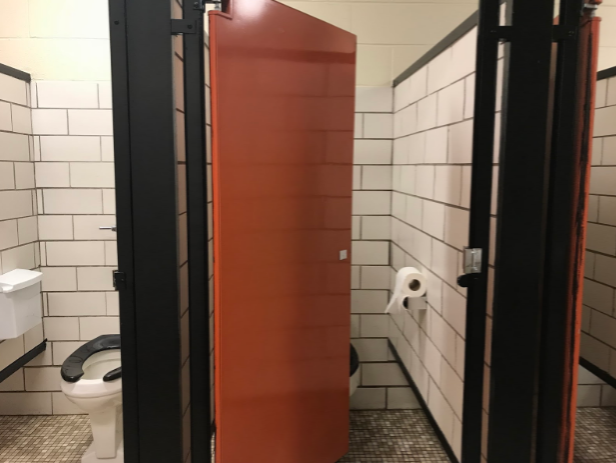Students Juuling in Bathrooms
Here is the second hall bathroom, proven to be a popular destination for juuling. These students have done so despite the risk of being caught by teachers who have recently been more intent on monitoring the bathrooms because of the issue. “Smoking chemicals is not something that the faculty of the school supports. We’re against it heavily,” said Jonathan Huether.
You never know what’s happening behind closed stalls.
Students have recently been engaging in juuling, which is vaping with a small e-cigarette that dissolves the vapor quicker than other devices do, making it more discreet. They do so in what some thought was an area where teachers couldn’t catch them.
With an increasing amount of students taking advantage of restroom breaks to juul, it has become a concerning problem for faculty and administration. Disciplinary action has been taken for the students who have been caught, but this hasn’t eliminated the problem. Although faculty and administration view students juuling as unacceptable, students who juul possess an entirely different perspective.
Because of students leaving class to juul, many teachers have had to use time that could’ve been spent educating to monitor the bathrooms for potential juulers. Juuls have been confiscated from the students who have been caught in the act while the students were written up. The administration has sent students to ISAP and called their parents as well.
“I think it’s unfair that teachers have to write up people because that’s not what their job should be,” said Jonathan Huether, who in particular has had to punish many guilty students.
“It is slowly growing. It has definitely become our biggest discipline issue that we deal with this year,” said Assistant Principal Cynthia Bell.
Despite the consequences that have been given to students for juuling, many students are still willing to take the risk. “I try not to be stupid about it, but there’s always a risk, so I guess I don’t really mind taking it,” said an anonymous student who continues to juul almost every day in the bathroom due to it relieving stress.
Huether believes that making more of an effort to educate students about the damage that juuling does to their bodies would help combat the problem. Since many students are unaware of the effects that juuling could have on them, they don’t think twice about it before taking those puffs.
The administration plans to continue enforcing the “no vaping” policy as a deterrent and brainstorming new ideas to mitigate this issue. But they too believe that if students understood the severity of what vaping is doing to their bodies that they would reconsider their actions. There also isn’t enough research to argue against vaping, and this leads some students to thinking it’s harmless.
Although students may view these consequences as unfair, the administration is enforcing them for their own well-being. Bell claims that she has witnessed these kinds of problems around her growing up and seen how it has affected people. Therefore, she doesn’t want to let the same thing happen to the next generation of students when it could be prevented. “I wish students would make better decisions for themselves,” said Assistant Principal Kari Stewart.
Because it is illegal to bring tobacco into school and to buy tobacco if you’re under eighteen, the faculty and administration deems it fair for them to punish students caught juuling. And filling their bodies with harmful chemicals is not something they would ever support. Some students, on the other hand, don’t think that them juuling should affect others since matters relating to their own body should be their decision alone. “If I’m looking at it from their point of view I understand completely, but from my point of view, chill out. I’m not hurting anyone but myself,” said the anonymous student. “I think if you’re lowkey about it and not flaunting it around and doing it in people’s faces, why not?”
Students may also argue that some people have become addicted to nicotine from juuling, so taking away their means to do so could result in them acting out from withdrawals during school. This could cause more of a distraction than students being reprimanded for juuling.










